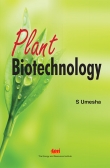Genetically Modified Organisms
Emerging Law and Policy in India
- Author(s): K D Raju
- Size: 180 mm × 240 mm
- Pages: 288
- Binding: Paperback
- Weight: 550 gms
- Language: English
- ISBN: 9788179931264
- Cover Price:
Rs.795.00 / US $50.00
- Special Price: Rs. 716.00 / US $45.00
Book Details
The scientific controversies involving genetic science and ?biosafety? have not been well understood by many. All claims about GMOs (genetically modified organisms) or LMOs (living modified organisms) are under controversy. The Cartagena Protocol is the first international agreement to regulate the transboundary movement of GMOs. Under the Convention on Biological Diversity, 190 countries agreed on the importance and concern over the spread and cross-border transfer of GMOs and their risks to environment and human health. Consequently, in 2000, they adopted the Cartagena Protocol to address the possible risks of GMOs. The protocol is an important step in the protection of biodiversity and biosafety. The concern of developing countries are not shared by the developed countries like the US, Canada, and Mexico. These countries produce more than 90% of the LMO crops and they are not ratified by the protocol. The protocol explicitly stipulates that countries should take precautionary measures to prevent GMOs from causing harm to biodiversity and human health.
Members have to implement the protocol provisions at the domestic level. There are heated debates in India whether to allow the cultivation of GMOs? The civil society organizations are opposing the entry of multinational companies in the field trial of GMOs. In this scenario, a systematic review of the international legal regime to formulate a comprehensive policy on the subject in India is the need of the hour.
The current volume focuses on the international and national legal regimes and the Indian situation is analysed closely. The book sets out the scientific debate first, because it is the first cross-cutting point. Socio-economic analyses of some case studies from states are also taken up. Later part of the discussions is centred around the evolving international law on the subject. The Indian laws on this subject are found to be obsolete. This book seeks to provide an accessible discussion on the subject that includes social, economic, legal, and other issues related to GMOs, which are frequently raised in India. The discussions in the volume significantly contribute to the ongoing debate and serve as an important input for policy-making on this subject in India.
Key Features
-
• It is a well researched book.
• The book describes the laws and policies governing genetically modified organisms.
• Complicated laws are presented in a simple language.
• Each chapter is provided with ample of case studies.
• Certain biotechnological aspects have also been explored.
Target Audience
-
Law students, lawyers, policy-makers
Table of Contents
-
• Is genetically modified technology desirable? The law and economics of Bt cotton
• Biotechnology applications in the agriculture sector: Cartagena Protocol and possible conflict with different international agreements
• Genetically modified organisms and biosafety: an Indian perspective
• The liability question under multilateral environmental agreements: an appraisal
• Standard of liability under the Cartagena Protocol on Biosafety: need for an equitable regime
• Precaution, risk, and biotechnology: a comparison of the Cartagena
• Protocol on Biosafety and the WTO Agreement on the Application of Sanitary and Phytosanitary Measures
Keywords
You may also like...
-
 Plant Biotechnology
Regular Price 795.00
Special Price 715.00
Plant Biotechnology
Regular Price 795.00
Special Price 715.00

